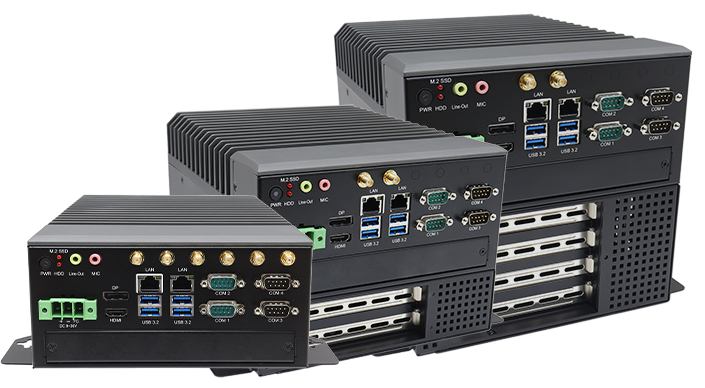In environments where conditions are far from ideal—such as factories, construction sites, transportation hubs, and outdoor monitoring stations—standard computers often fall short. They are vulnerable to dust, water, shock, vibration, and temperature extremes, making them unsuitable for critical industrial applications. This is where rugged box PCs come into play. Engineered for durability, flexibility, and performance, rugged box PCs are built to handle demanding conditions without sacrificing reliability or computing power.
One such reliable solution is the Rugged Box Pc, designed with industrial-grade components and housed in a fanless, waterproof, and dustproof enclosure. These systems are optimized for mission-critical tasks in harsh environments, offering features such as extended temperature tolerance, multiple I/O ports, and long-term operational stability. Whether it’s for manufacturing control systems, transportation networks, or remote surveillance, rugged box PCs deliver dependable computing where it’s needed most.
Durability in Harsh Environments
The defining feature of a rugged box PC is its ability to withstand tough environmental conditions. Unlike traditional desktop computers, these systems are enclosed in ruggedized cases made from materials like aluminum alloy, providing protection against physical impact, moisture, and corrosive substances. With ingress protection ratings (often IP65 or higher) and compliance with MIL-STD standards for shock and vibration, they are built to survive in both indoor and outdoor industrial scenarios.
The fanless design further enhances durability by eliminating moving parts that could fail due to dust accumulation or mechanical wear. Passive cooling through heatsinks and chassis materials ensures stable thermal performance without the need for air circulation, making these PCs ideal for dusty or moisture-prone settings.
Space-Saving, Mountable Design
Rugged box PCs are known for their compact, space-saving form factor. Their small size makes them easy to install in control cabinets, vehicles, kiosks, and equipment enclosures. Most units offer versatile mounting options, including wall, DIN rail, or VESA mounts, enabling seamless integration into tight or specialized spaces.
This flexibility is particularly useful for mobile or remote applications such as smart transportation systems, outdoor kiosks, or field-deployed sensors, where space is limited and robustness is non-negotiable.
High Performance with Low Power Consumption
Despite their compact size, rugged box PCs do not compromise on performance. These systems are equipped with high-efficiency processors (often Intel Core or Atom series), generous RAM options, and solid-state drives (SSDs) to handle a wide range of tasks—from data collection and processing to machine control and video analytics.
Designed for 24/7 operation, rugged box PCs deliver consistent performance while consuming minimal power. This efficiency makes them ideal for energy-conscious operations and remote setups powered by solar or battery systems.
Extensive I/O and Connectivity Options
One of the key advantages of rugged box PCs is their wide range of I/O ports. They are often equipped with multiple USB, COM, LAN, HDMI, and GPIO interfaces to support various industrial peripherals such as sensors, barcode readers, cameras, and PLCs.
Some models also feature expansion slots for Wi-Fi, 4G/5G modules, or additional storage, offering further flexibility in deployment. These connectivity options make it easy to integrate rugged box PCs into existing industrial networks and control systems, regardless of complexity.
Extended Operating Temperature and Voltage Range
Industrial and outdoor applications often expose equipment to extreme temperature swings. Rugged box PCs are built to function reliably in wide temperature ranges—typically from -20°C to +60°C or more. This capability ensures stable operation whether the unit is installed in a cold storage facility, a roadside cabinet, or a hot factory floor.
In addition, many rugged box PCs support wide voltage input ranges (e.g., 9V to 36V), making them suitable for use in transportation and field applications where power sources may fluctuate.
Low Maintenance and Long-Term Availability
Thanks to their robust construction and fanless design, rugged box PCs require very little maintenance. There are fewer points of failure, which translates into less downtime and lower operational costs. This reliability is crucial in environments where maintenance is difficult or disruptive.
Moreover, industrial-grade manufacturers often guarantee long-term product availability and support, ensuring that the same hardware platform remains in production for many years. This is particularly valuable for industries that require stable system configurations and long product lifecycles.
Conclusion
Rugged box PCs offer a reliable and efficient computing solution for industrial and outdoor environments that demand durability, performance, and flexibility. From their tough enclosures and fanless cooling systems to their extensive I/O options and power efficiency, these systems are tailored to meet the needs of modern industries. By investing in a rugged box PC, businesses can ensure continuous operation, reduce maintenance overhead, and increase system resilience in even the harshest conditions.

